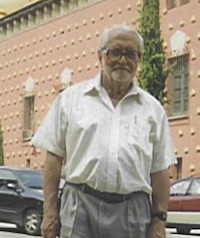Today I learned of the death of Herb Grosch, proud provocateur and mischief-maker of the computing industry. Anybody who ever knew Herb, however slightly or briefly, has a story to tell, so here’s mine.
Grosch held senior positions at major household-name companies (IBM, General Electric) as well as in the U.S. government; he also spent time at MIT and Columbia and was editor of Computerworld. But through it all he cultivated the role of the outsider, or even the outcast; he saw himself as a lone wolf; at IBM they labeled him a “wild duck.” He boasted that he was the second scientist ever hired at IBM (after Wallace Eckert) and, more important, was the first employee with facial hair. Even when he was an insider he was an outsider. Grosch was elected president of the Association for Computing Machinery–but as a dissident candidate, opposing the slate annointed by the nominating committee.
The free-spirited maverick is a celebrated figure in American culture, but not always a well-rewarded one. Wild ducks don’t get tenure, or a pension.
My brief encounter with Herb came ten years ago, when I was working on an article (PDF) about the uses of ternary notation in computing. I read somewhere that Grosch had proposed a ternary architecture for the Whirlwind, Jay Forrester’s enormous early electronic computer. The idea of a base-three machine probably seems weirder today than it did in the early 1950s, but all the same the proposal was not adopted, and most histories of the Whirlwind project say little or nothing about the ternary option. I had no luck finding a copy of Grosch’s memo on the subject, so I tried getting in touch with him directly. With the help of friends I tracked him down, though not in the first place I looked. He was in Riga, Latvia.
Grosch couldn’t supply a copy of the memo; most of his papers, he said, were buried in a landfill in Switzerland. The best he could do was point me to a passage in his autobiography, summarizing a conversation with Forrester:
I said what might be genuinely gainful would be to store a ternary digit in each core, and calculate in base-three rather than binary fashion. There were materials–some kinds of permalloy, as I remember–that had north, south and neutral stable magnetic states. I told him I had taught my Poughkeepsie evening classes at IBM about a special kind of base-three arithmetic I called “signed ternary,” in which zero was in the middle of the number range. In this curious system there was no need for algebraic signs, no problem about the sign of zero, and you rounded perfectly by dropping digits.
Jay being a stiff type, I refrained from calling the ternary digits “tits,” a name which had been the source of much boyish amusement in the Poughkeepsie classes.
By the way, I’m still looking for a copy of that memo. Here’s the reference: Grosch, H. J. R. 1952. Signed ternary arithmetic. Memorandum M-1496, Digital Computer Laboratory, MIT.

Of course I had to ask Herb how and why he’d found his way to Latvia. It was a long story, involving a small NSF grant, archives of Datamation magazine, a collection of Soviet-era computer hardware in an attic at Latvia University, and a romance that Herb hoped would develop into his fifth marriage. But the grant ran out, the marriage plans faltered, and Herb was heading back to U.S. in dire need of employment. His hopes, he said, were “not much above fast-foodery: editing, or tech writing, or even clerking at Barnes and Noble.” He was 82 at the time.
In the end, he did not have to stoop quite so far as editing or tech writing, or Barnes and Noble; he became Adjunct Distinguished Professor of Computer Science at the University of Nevada Las Vegas. But that posting didn’t last long. A few years later he turned up in Toronto, teaching the history of computing, but by then I’d lost touch with him.
In a “Dear Everybody” message some years ago, Grosch wrote:
I begin this letter on the fourth of six recent Binary Days, 01.11.01…. The next Binary Day will be nine years from now, 01.01.10, and I will write again then if I survive. Shorter recipient list, I assume!
Herb did make it until 01.01.10. He died January 25th. For more on his life and works, see the ACM obituary and a web site at Columbia maintained by Frank da Cruz.

“Signed ternary” is almost certainly referring to “Balanced Ternary”.
Here is one reference describing balanced ternary, although I have a feeling you do not need it. :-)
Warning: OT!
Love your blog, just started reading it several days ago. Found it while surfing for opinions to help me decide whether to restart a subscription to Sci Am. I loved that mag in 70s and 80s but gave up in the 90s. Still no better with a new editor so I guess it’s gone for good.
Anyway! I’ve been going back through your entries and soon became aware it was rather annoying that the entries must be read from bottom-to-top, while of course within each entry one reads top-to-bottom. So when starting a new month I scroll clear to the bottom, scroll up slowly to find the top of the last (earliest) entry, then when finished slowly go back up /two/headings to find the next (newer), etc. Argh! Why not just put the newest entry at the bottom each time?? Then the whole thing reads nicely top-to-bottom.
Thanks :-)